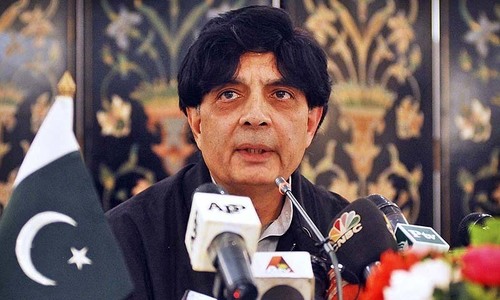ISLAMABAD: The federal government has rejected the Sindh government’s request for taking action against certain “suspected” seminaries, describing the information provided in this regard by the provincial authorities as “insufficient, ambiguous and without any credible evidence”.
Through a letter, the interior ministry has instead asked the Sindh government to inform the federal government of the action the provincial authorities have so far taken against the “suspected” seminaries, if it has any concrete evidence against them because taking action against such elements falls in the domain of the provincial governments.
“If there was any concrete evidence available against the people affiliated with these seminaries, then what action the provincial government, police and other law enforcement agencies have taken against them?” asked the letter whose contents in Urdu were released to the media by the ministry here on Thursday.
Terms information ‘incomplete and without concrete evidence’
Talking to reporters in his Parliament House chambers, Interior Minister Chaudhry Nisar Ali Khan had disclosed that the Sindh government, through a letter written to his ministry, had sought proscription of 94 ‘suspected’ religious seminaries.
Terming the provincial government’s move “ridiculous”, the minister had stated that it was for the provinces to take action against the suspected religious seminaries. He had also regretted that before the letter had reached the interior ministry, the Sindh chief minister had made a statement about it.
In its reply to the provincial government, the interior ministry has alleged that the “incomplete information” and “ambiguous language” of the Sindh government’s communication gives the impression that the letter has been written by the provincial authorities “with some political motives and to hide their own lapses” in the implementation of the National Action Plan (NAP) against terrorism.
Through the letter, the interior ministry has regretted that the list provided by the provincial authorities does not have complete addresses of the “suspected seminaries”, and even has the names of seminaries in other provinces, including Khyber Pakhtunkhwa, Punjab and Fata.
“The Sindh government’s request for action against the seminaries functioning outside its administrative control and outside its geographical boundaries and without any concrete evidence in incomprehensible,” says the letter, which adds: “Apparently, it seems that the provincial authorities have not fully studied the legal requirements for proscribing any organisation.” The ministry has “advised” the Sindh government “to remain confined to its geographical limits” and provide “credible” information, keeping in mind that “every action against seminaries requires legal justification”.
The interior minister has been facing criticism from leaders of the main opposition Pakistan People’s Party, which is the ruling party in Sindh, for the past many months over his alleged failure to fully implement the NAP against terrorism.
Published in Dawn, January 13th, 2017














































